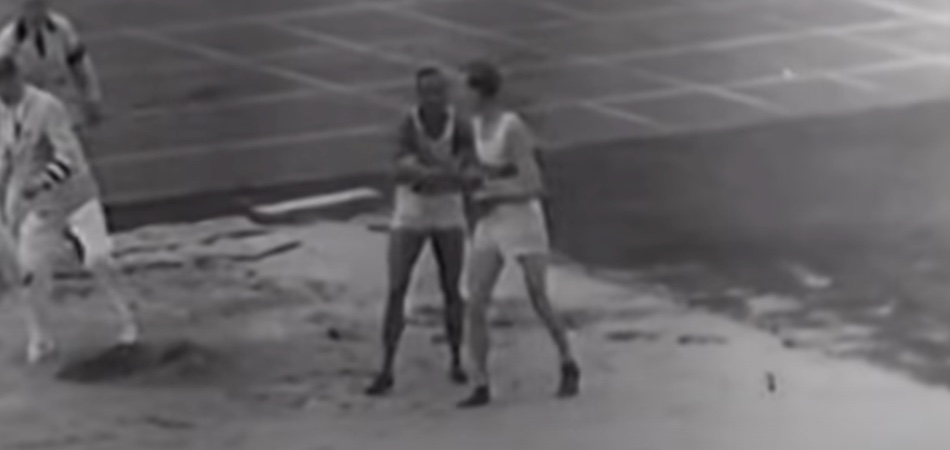De Coubertin, the father of the modern Olympics, is a figure who probably deserves his own post. A French aristocrat who became an academic and educator, he was obsessed with the English concept—or at least his idea of the concept—that sport builds character. He admired the way sport culture in the English public schools could create “moral and social strength,” and credited it with…well, just about everything, including England’s vast international influence. France’s humiliation in the Franco-Prussian war influenced his work, in that he thought a more robust, athletic country would be better able to win such wars. He also worshipped ancient Greece, and thought their own athletic culture had been revived in the English model. He was never able to establish such a curriculum in French school, which at one time was the central mission of his life, but considering his passions, it’s no surprise that he managed to revive the Olympic games.
(One interesting note about De Coubertin: Though he envisioned the Olympics as a definitely amateur showcase, he didn’t like the way certain English sports like rowing excluded the working class, and thought Olympic athletes should be compensated for their time away from work.)
(Another funny thing: There was a “sport” called Literature in the 1912 games, and Pierre De Coubertin won a gold medal for a poem called “Ode to Sport.” It was apparently submitted under a pseudonym. In fact, art competitions were held all the way up to 1948.)
But the reason we’re here today is not for a De Coubertin bio, but to talk about the award named in his honor. The Pierre De Coubertin medal is awarded for acts of sportsmanship at the Olympics. It has been given out 26 times, and in recent years some of the recipients have been financial backers of the Games. But the situations in which it was given out for “sportsmanship” are fascinating, so I thought I’d highlight a few of those here.
1936 – Luz Long – Germany
This was the first PDC medal awarded, posthumously in 1964, to honor an interaction between Long and Jesse Owens. It’s a wonderful story, and it was conveyed by Owens to Long’s song that year. It goes like this: Owens, a black American facing down the white supremacist Nazi regime, foot-faulted on his first two long jump attempts. Before his third, the German long jumper and European record holder Luz Long approached him as a friend and fellow competitor, and advised him to simply take off a few inches earlier to be sure he qualified for the finals—after all, Owens was such a superior athlete that he could sacrifice a few inches. He even helped him mark off a short distance in front of the takeoff board. The American took his advice, qualified, and went on to win the gold medal that afternoon, and four gold medals in those Berlin Olympics. Long selflessly sacrificed his own chance to win a gold, and did it in front of Hitler, no less.
I read and believed this story for most of my childhood and adulthood, and considered it one of the greatest tales of sportsmanship ever. So it broke my heart earlier this year to learn that it wasn’t true—Owens had made it up, and when confronted by a journalist, he said, “those stories are what people like to hear, so you tell ’em.”
All that said, Long did embrace Owens in front of Hitler, and before he died in WW2, he wrote Owens a letter, saying in part, “Someday find my son … tell him about how things can be between men on this Earth.”
And Owens did just that…even if he fudged the truth.
You can watch Owens’ final jump, the hug between the two men, and finally the conversation between Owens and Long’s son, at the 28-minute mark here.
1964 – Eugenio Monti, Italy
Monti, a bobsledder, was the second recipient of the award, and his story is much simpler—at the 1964 winter Games in Austria, he loaned a bolt from his sled to the British team after theirs broke down. That was in the 2-man race, and later, in the 4-man race, a Canadian team damaged their axle, and Monti and his crew of mechanics fixed it for them. Remarkably, both teams he helped won the gold medal, while Monti took bronze in each event. In its less dramatic way, this was a real Luz Long story—someone giving selflessly of themselves in a way that cost them standing in their own event.
In 1968, now 40, Monti won a gold medal in both events. You can look for sports karma far and wide, and routinely be disappointed, but here it seems that on some universal level, Monti was rewarded.
1988, Lawrence Lemieux, Canada
You should always go from low stakes to high in writing, and the transition now is from a missing bolt on a bobsled to a life-saving rescue mission at sea. At the Seoul games in 1988, Lemieux, a sailor in the Finn class, found himself in second place in the fifth of seven races in his class. The wind picked up to 35 knots, and Lemieux watched as a team from Singapore, racing nearby in a different race, struggled with the conditions. Finally, their boat capsized, and without considering his own position, Lemieux raced to their rescue, pulling the injured men out of the water and waiting for a patrol boat that could bring them to safety.
Then, amazingly, he rejoined his own race and finished 22nd. The IOC, hearing the story, restored his second-place finish. Lemieux didn’t win a medal, but he had a great quote in 2012 when asked about it: “You spend your life working really hard internationally and you get very few accolades. So that’s the ironic thing; 25 years after this rescue, we’re still talking about it.”
2004, Vanderlei de Lima, Brazil
You can’t get very deep into Olympic history without things getting weird—it’s just an immutable fact. Which brings us to de Lima, a marathoner for Brazil who competed in the Athens 2004 Games. In that race, leading by 25 seconds at the 22-mile mark, de Lima was attacked—and I mean that literally—by an Irish priest named Neil Horan. The stated mission of this insane priest, who had previously run out onto the tracks at a Formula One race (you really have to see it to believe it), was to “spread the gospel and prepare people for the second coming.”
De Lima was only waylaid for a few seconds, but there’s no telling what kind of psychological impact it had. He was caught by the two runners behind him two miles later and finished with the bronze medal, and though the Brazilian delegation appealed on his behalf, the IOC rejected it. It’s tough to know if he would have been caught regardless, but, clearly, the attack didn’t help.
The PDC medal can be seen as a sort of consolation prize in this case, but for persevering and still managing to win a medal, de Lima certainly deserves it.



Thank you for this one, Shane, really good stuff to know and remember.